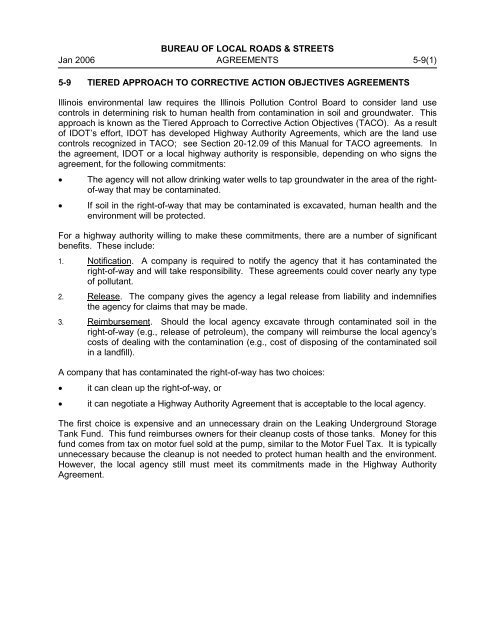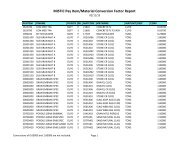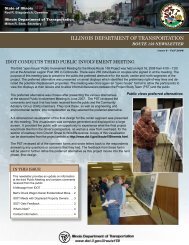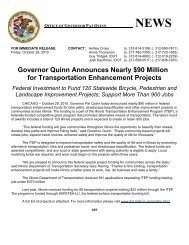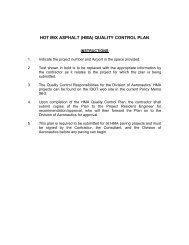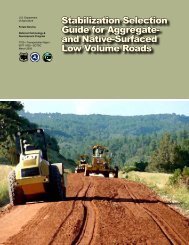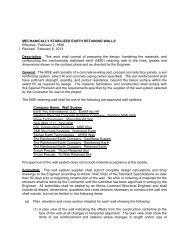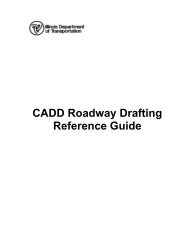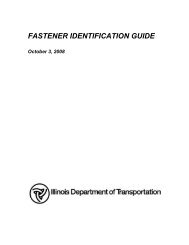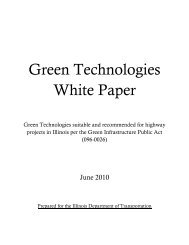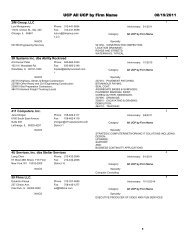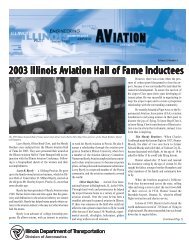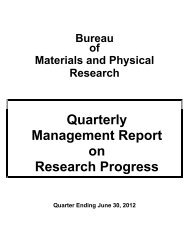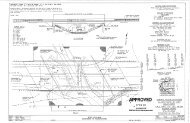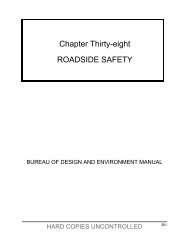Chapter Five AGREEMENTS - Illinois Department of Transportation
Chapter Five AGREEMENTS - Illinois Department of Transportation
Chapter Five AGREEMENTS - Illinois Department of Transportation
Create successful ePaper yourself
Turn your PDF publications into a flip-book with our unique Google optimized e-Paper software.
BUREAU OF LOCAL ROADS & STREETS<br />
Jan 2006 <strong>AGREEMENTS</strong> 5-9(1)<br />
5-9 TIERED APPROACH TO CORRECTIVE ACTION OBJECTIVES <strong>AGREEMENTS</strong><br />
<strong>Illinois</strong> environmental law requires the <strong>Illinois</strong> Pollution Control Board to consider land use<br />
controls in determining risk to human health from contamination in soil and groundwater. This<br />
approach is known as the Tiered Approach to Corrective Action Objectives (TACO). As a result<br />
<strong>of</strong> IDOT’s effort, IDOT has developed Highway Authority Agreements, which are the land use<br />
controls recognized in TACO; see Section 20-12.09 <strong>of</strong> this Manual for TACO agreements. In<br />
the agreement, IDOT or a local highway authority is responsible, depending on who signs the<br />
agreement, for the following commitments:<br />
• The agency will not allow drinking water wells to tap groundwater in the area <strong>of</strong> the right<strong>of</strong>-way<br />
that may be contaminated.<br />
• If soil in the right-<strong>of</strong>-way that may be contaminated is excavated, human health and the<br />
environment will be protected.<br />
For a highway authority willing to make these commitments, there are a number <strong>of</strong> significant<br />
benefits. These include:<br />
1. Notification. A company is required to notify the agency that it has contaminated the<br />
right-<strong>of</strong>-way and will take responsibility. These agreements could cover nearly any type<br />
<strong>of</strong> pollutant.<br />
2. Release. The company gives the agency a legal release from liability and indemnifies<br />
the agency for claims that may be made.<br />
3. Reimbursement. Should the local agency excavate through contaminated soil in the<br />
right-<strong>of</strong>-way (e.g., release <strong>of</strong> petroleum), the company will reimburse the local agency’s<br />
costs <strong>of</strong> dealing with the contamination (e.g., cost <strong>of</strong> disposing <strong>of</strong> the contaminated soil<br />
in a landfill).<br />
A company that has contaminated the right-<strong>of</strong>-way has two choices:<br />
• it can clean up the right-<strong>of</strong>-way, or<br />
• it can negotiate a Highway Authority Agreement that is acceptable to the local agency.<br />
The first choice is expensive and an unnecessary drain on the Leaking Underground Storage<br />
Tank Fund. This fund reimburses owners for their cleanup costs <strong>of</strong> those tanks. Money for this<br />
fund comes from tax on motor fuel sold at the pump, similar to the Motor Fuel Tax. It is typically<br />
unnecessary because the cleanup is not needed to protect human health and the environment.<br />
However, the local agency still must meet its commitments made in the Highway Authority<br />
Agreement.


